非谓语动词常考知识用法必背
高中英语知识点归纳非谓语动词的用法总结
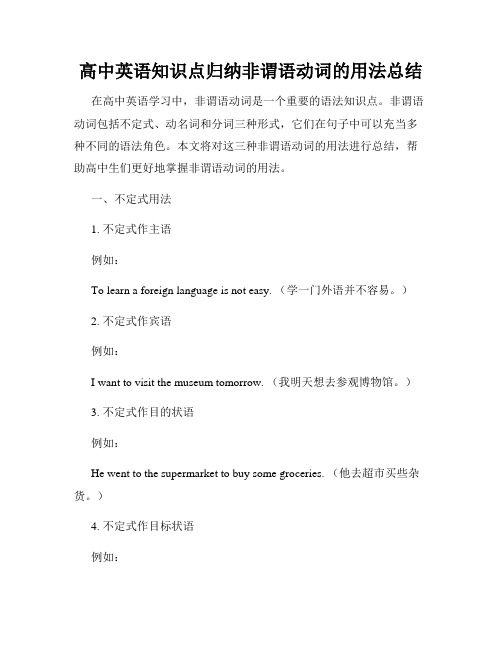
高中英语知识点归纳非谓语动词的用法总结在高中英语学习中,非谓语动词是一个重要的语法知识点。
非谓语动词包括不定式、动名词和分词三种形式,它们在句子中可以充当多种不同的语法角色。
本文将对这三种非谓语动词的用法进行总结,帮助高中生们更好地掌握非谓语动词的用法。
一、不定式用法1. 不定式作主语例如:To learn a foreign language is not easy. (学一门外语并不容易。
)2. 不定式作宾语例如:I want to visit the museum tomorrow. (我明天想去参观博物馆。
)3. 不定式作目的状语例如:He went to the supermarket to buy some groceries. (他去超市买些杂货。
)4. 不定式作目标状语例如:We need to study hard to pass the exam. (为了通过考试,我们需要努力学习。
)5. 不定式作定语例如:The girl to my left is my best friend. (我左边的那个女孩是我最好的朋友。
)二、动名词用法1. 动名词作主语例如:Swimming is my favorite sport. (游泳是我最喜欢的运动。
)2. 动名词作宾语例如:He enjoys playing basketball. (他喜欢打篮球。
)3. 动名词作介词宾语例如:She is good at dancing. (她擅长跳舞。
)4. 动名词作宾语补足语例如:I find it difficult to understand his speech. (我觉得理解他的演讲很困难。
)5. 动名词作定语例如:The running water sounds so relaxing. (流水的声音听起来很放松。
)三、分词用法1. 现在分词作定语例如:The book on the table is mine. (桌子上的那本书是我的。
高中英语知识点归纳非谓语动词的用法
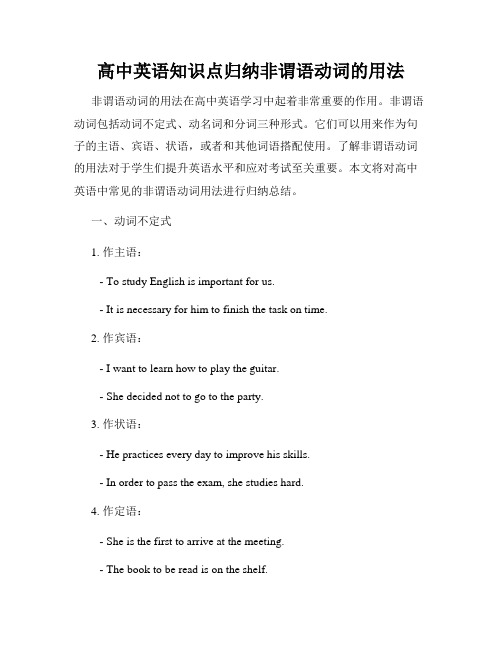
高中英语知识点归纳非谓语动词的用法非谓语动词的用法在高中英语学习中起着非常重要的作用。
非谓语动词包括动词不定式、动名词和分词三种形式。
它们可以用来作为句子的主语、宾语、状语,或者和其他词语搭配使用。
了解非谓语动词的用法对于学生们提升英语水平和应对考试至关重要。
本文将对高中英语中常见的非谓语动词用法进行归纳总结。
一、动词不定式1. 作主语:- To study English is important for us.- It is necessary for him to finish the task on time.2. 作宾语:- I want to learn how to play the guitar.- She decided not to go to the party.3. 作状语:- He practices every day to improve his skills.- In order to pass the exam, she studies hard.4. 作定语:- She is the first to arrive at the meeting.- The book to be read is on the shelf.5. 作表语:- My dream is to become a doctor.- The important thing is to keep calm.6. 作补语:- I need you to help me with the project.- He made her laugh.二、动名词1. 作主语:- Learning a new language requires patience. - Swimming is good for health.2. 作宾语:- I enjoy reading books in my free time.- She admitted stealing the money.3. 作状语:- He left without saying goodbye.- She passed the test by studying hard.4. 作定语:- The running water is very clean.- I heard someone singing in the distance.5. 作表语:- His favorite hobby is playing basketball.- The key to success is hard work.6. 作补语:- I started regretting not studying harder.- They kept us waiting for hours.三、分词1. 现在分词(-ing形式):- The running boy is my brother.- She saw a smoking man on the street.2. 过去分词(-ed/-en形式):- The broken vase needs to be replaced.- They were excited by the surprising news.3. 作状语:- Enjoying the beautiful scenery, we went for a walk.- Being well-prepared, she felt confident in the interview.4. 作定语:- The lost cat was found by its owner.- The written report should be handed in by tomorrow.5. 作补语:- She was surprised to find her car stolen.- I felt exhausted after running for an hour.综上所述,高中英语中的非谓语动词有动词不定式、动名词和分词三种形式,它们在句子中能够充当不同的成分,起到丰富语言表达和提高语言准确性的作用。
高中英语:非谓语动词考点全总结!含义+用法+例题讲解
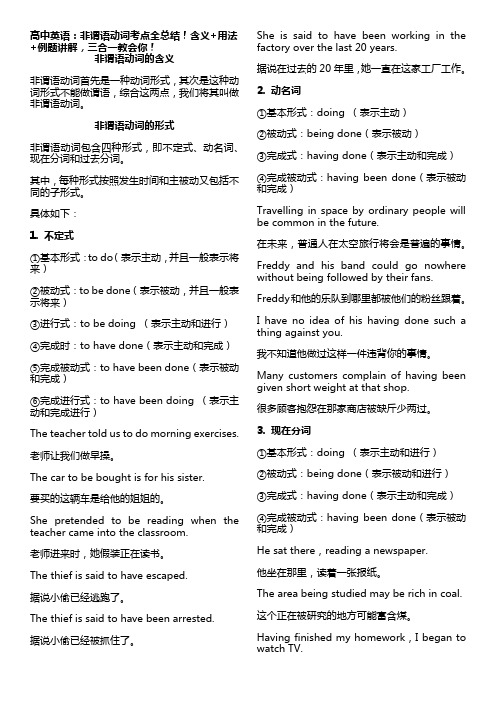
高中英语:非谓语动词考点全总结!含义+用法+例题讲解,三合一教会你!非谓语动词的含义非谓语动词首先是一种动词形式,其次是这种动词形式不能做谓语,综合这两点,我们将其叫做非谓语动词。
非谓语动词的形式非谓语动词包含四种形式,即不定式、动名词、现在分词和过去分词。
其中,每种形式按照发生时间和主被动又包括不同的子形式。
具体如下:1. 不定式①基本形式:to do(表示主动,并且一般表示将来)②被动式:to be done(表示被动,并且一般表示将来)③进行式:to be doing (表示主动和进行)④完成时:to have done(表示主动和完成)⑤完成被动式:to have been done(表示被动和完成)⑥完成进行式:to have been doing (表示主动和完成进行)The teacher told us to do morning exercises. 老师让我们做早操。
The car to be bought is for his sister.要买的这辆车是给他的姐姐的。
She pretended to be reading when the teacher came into the classroom.老师进来时,她假装正在读书。
The thief is said to have escaped.据说小偷已经逃跑了。
The thief is said to have been arrested.据说小偷已经被抓住了。
She is said to have been working in the factory over the last 20 years.据说在过去的20年里,她一直在这家工厂工作。
2. 动名词①基本形式:doing (表示主动)②被动式:being done(表示被动)③完成式:having done(表示主动和完成)④完成被动式:having been done(表示被动和完成)Travelling in space by ordinary people will be common in the future.在未来,普通人在太空旅行将会是普遍的事情。
(完整版)非谓语动词考点总结归纳

Tom is sure of passing the exam. ( Tom 对自己通过考试很有把握 .)
考点三:非谓语动词作表语 不定式、动名词、分词做表语:
1. 不定式做表语常表示谓语动词所表示动作之后发生的动作。不定式一般紧跟在系动词如
: be, seem, remain,
appear 等后面 , 用来说明主语的内容。这类结构中的主语一般为名词,如:
We met many guests ,most of them Americans.( 补充说明 )
非谓语动词考点总结归纳
非谓语动词包括 不定式,动名词和分词 。它们是高中所学的基础语法,也是高考必考内容。既是高考的难点又是 高考的热点。真正领悟非谓语动词的用法要具备以下基础知识:
①具有句子结构的知识,会分析句子成分。 ②具有简单句最基本的五种句型的知识,要分得清双宾语和复合宾语。 ③具有扎实而丰富的动词知识,要分得清及物动词和不及物动词。 ④具备各种复合句的知o melt.
2) 当 begin 和 start 用于进行时时 .
eg: He is beginning to study English.
3) 当 begin 和 start 后面跟着一些表示心理状态的词时 . eg: I began to believe his story.
2.分词 解题诀窍:找逻辑主语,辨逻辑关系,析动作先后
语法作用:
1)表示时间,相当于表示时间,相当于状语从句
when, while 。常用于连词 When, before, while, after,
since 等后面。也可以省略连词
eg. When allowed, we are supposed to come into the room.
非谓语动词的用法口诀
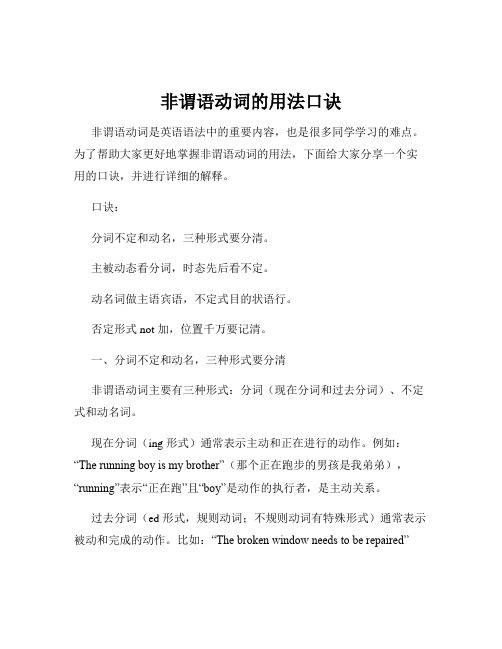
非谓语动词的用法口诀非谓语动词是英语语法中的重要内容,也是很多同学学习的难点。
为了帮助大家更好地掌握非谓语动词的用法,下面给大家分享一个实用的口诀,并进行详细的解释。
口诀:分词不定和动名,三种形式要分清。
主被动态看分词,时态先后看不定。
动名词做主语宾语,不定式目的状语行。
否定形式 not 加,位置千万要记清。
一、分词不定和动名,三种形式要分清非谓语动词主要有三种形式:分词(现在分词和过去分词)、不定式和动名词。
现在分词(ing 形式)通常表示主动和正在进行的动作。
例如:“The running boy is my brother”(那个正在跑步的男孩是我弟弟),“running”表示“正在跑”且“boy”是动作的执行者,是主动关系。
过去分词(ed 形式,规则动词;不规则动词有特殊形式)通常表示被动和完成的动作。
比如:“The broken window needs to be repaired”(那个打破的窗户需要修理),“broken”表示“被打破的”,窗户是“被打破”,是被动关系。
不定式(to +动词原形)具有多种含义,如表示目的、将来等。
像:“To pass the exam, he studies hard”(为了通过考试,他努力学习),“To pass the exam”表示目的。
动名词(动词的ing 形式)具有名词的特征,可以作主语、宾语等。
例如:“Swimming is my favorite sport”(游泳是我最喜欢的运动),“swimming”在这里作主语。
二、主被动态看分词,时态先后看不定在判断使用现在分词还是过去分词时,关键要看主被动关系。
如果动作是主语主动发出的,就用现在分词;如果动作是主语承受的,就用过去分词。
例如:“The teacher was satisfied with the students' answered questions”(老师对学生们回答的问题很满意),“answered”是过去分词,因为“questions”是“被回答”的。
英语语法非谓语动词口诀整理版
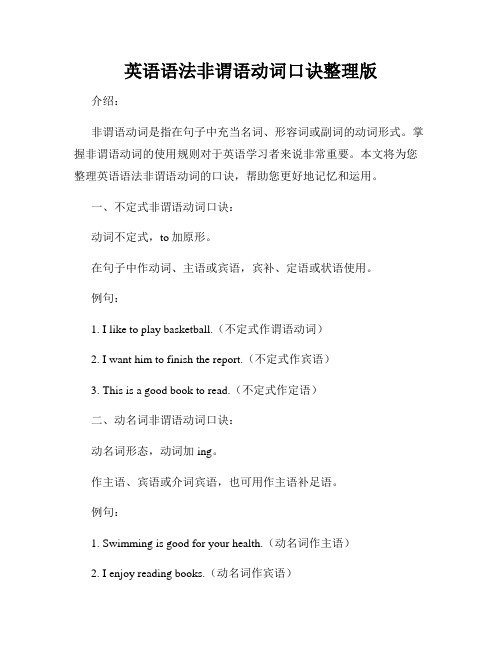
英语语法非谓语动词口诀整理版介绍:非谓语动词是指在句子中充当名词、形容词或副词的动词形式。
掌握非谓语动词的使用规则对于英语学习者来说非常重要。
本文将为您整理英语语法非谓语动词的口诀,帮助您更好地记忆和运用。
一、不定式非谓语动词口诀:动词不定式,to加原形。
在句子中作动词、主语或宾语,宾补、定语或状语使用。
例句:1. I like to play basketball.(不定式作谓语动词)2. I want him to finish the report.(不定式作宾语)3. This is a good book to read.(不定式作定语)二、动名词非谓语动词口诀:动名词形态,动词加ing。
作主语、宾语或介词宾语,也可用作主语补足语。
例句:1. Swimming is good for your health.(动名词作主语)2. I enjoy reading books.(动名词作宾语)3. She is interested in learning French.(动名词作介词宾语)三、过去分词非谓语动词口诀:过去分词表被动,辅助动词辅助上。
常与情态动词连用,表示完成或被动。
例句:1. The book was written by Mark Twain.(过去分词作谓语动词)2. The window was broken by the ball.(过去分词作宾语)四、不定式与动名词非谓语动词口诀:非谓语动词,变换形态。
动词不定式to加原形,动名词改成ing。
例句:1. I plan to go shopping tomorrow.(不定式作谓语动词)2. I remember seeing him at the party.(动名词作宾语)五、非谓语动词口诀:非谓语动词基本定,可做主语宾语定。
动名词表示活动,过去分词表示被动。
例句:1. To learn a new language is not easy.(不定式作主语)2. The movie was interesting.(过去分词作宾语)总结:掌握非谓语动词的使用是学习英语的重要一步。
(完整版)高考英语非谓语动词知识点
非谓语动词一、非谓语动词的概念非谓语形式有三种: 1.动词不定式:to do表示目的和将来2、动词的ing(动名词) : doing表示主动和进行 3.动词的过去分词:done表示被动和完成二、非谓语动词的时态和语态一般式完成式进行式不定式主动to do to have done to be doing被动to be done to have been doneing 形式主动doing having done被动being done having been done过去分词被动done三、非谓语动词的做题步骤:1、判定是否用非谓语形式。
方法:看看句子中是否已有了谓语动词了。
2、找非谓语动词的逻辑主语。
方法:非谓语动词的逻辑主语一般是句子的主语。
3、判断主被动关系。
方法:非谓语动词与其逻辑主语的主动还是被动关系。
4、判断时间关系。
方法:分析句子,看看非谓语动词所表示的动作发生在谓语动作之前、之后还是同时。
之前常用done; 之后常用to do; 同时常用doing。
一、非谓语动词作主语和表语的比较1、不定式和动名词作主语和表语:1). 不定式表示一次性的、具体的动词。
动词ing 常表示一般的、泛指的或习惯性的动作。
如:________ is a good form of exercise for both young and old.A. The walkB. WalkingC. To walkD. Walk2). 不定式作主语时,常用it 作形式主语,即用句型:It is + adj. / n. + (for / of sb. ) to do sth.It’s important for us to learn English well. It’s kind of you to help us.注意:下面几个句型是用动名词:It’s no good / use doing sth. There is no point(in)doing sth2、不定式、动名词、分词作表语的比较:1)、不定式、动名词作表语,.表示主语的内容。
高中英语知识点归纳非谓语动词的用法及常见形式
高中英语知识点归纳非谓语动词的用法及常见形式非谓语动词是指在句子中充当动词的形式,但不具备谓语的特征,不带有人称和数的变化。
非谓语动词包括不定式、动名词和动词的分词形式。
在高中英语学习中,非谓语动词的用法十分重要。
本篇文章将归纳总结高中英语知识点,介绍非谓语动词的用法及常见形式。
一、不定式(Infinitive)不定式通常由“to + 动词原形”构成,具有名词、形容词和副词的特点。
不定式可以作为主语、宾语、表语、定语和宾补等。
1. 作主语:To learn English well is important for students.学好英语对学生来说很重要。
2. 作宾语:I want to go shopping with my friends.我想和朋友一起去购物。
3. 作表语:Her dream is to become a doctor.她的梦想是成为一名医生。
4. 作定语:The best way to learn a foreign language is to practice more.学习外语的最好方法就是多练习。
5. 作宾补:She asked me to finish the report as soon as possible.她要求我尽快完成报告。
二、动名词(Gerund)动名词以动词的现在分词形式(-ing)作为主要构词方式,具有名词的特点,可作为名词的任何功能。
1. 作主语:Studying hard is the key to success.努力学习是取得成功的关键。
2. 作宾语:I enjoy singing in the shower.我喜欢在淋浴时唱歌。
3. 作表语:His favorite activity is swimming.他最喜欢的活动是游泳。
4. 作定语:I have a writing class tomorrow.我明天有一节写作课。
5. 作宾补:They felt like going for a walk after dinner.晚饭后他们想去散步。
(完整版)非谓语动词用法归纳(语法)
一、表格的用法1.doing 的用法(1)在要求动词后(作宾语):avoid避免appreciate 感激/欣赏acknowledge承认/自认admit 承认advocate 提倡/主张consider 考虑can't help不禁can't stand受不了contemplate细想complete完成confess坦白dislike 不喜欢,讨厌deserve值得delay延迟deny否认dread可怕defer拖延detest嫌恶enjoy享有/喜爱envy嫉妒endure忍受excuse借口escape逃跑/逃避finish完成forgive原谅fancy幻想/爱好favor 造成/偏爱figure描绘/计算hate讨厌imagine设想involve卷入/包含keep保持miss错过mention说到/讲到mind 介意pardon原谅/饶恕permit允许postpone推迟practice 实行/实践prevent阻止quit放弃停止risk冒险recall回想resist抵抗/阻止resume恢复repent悔悟resent怨恨stand坚持/忍受suggest建议save营救/储蓄tolerate忍受worth值得You should try to avoid making mistakes.The book is worth reading.The book deserves reading.(2)表进行Walking on the grassland, I saw a snake.=When I was walking on the grassland, I saw a snake.The man speaking English is Tom. = The man who is speaking English is Tom.(3)表主动The man speaking English is Tom = The man who speaks English is Tom.= The man who spoke English is Tom.Nobody dinks boiling water but boiled water.= Nobody dinks water that is boiling but the water that has boiled. (4)表伴随I stand outside waiting for Mr. Chen.I lie in bed reading a novel.(5)表性质;特点The film is very moving.She is understanding, so you had better discuss your business with her.(6)概括性,一般性Climbing mountain is very interesting.Driving a car during the rush hour is tiring.在高峰时刻开车令人厌烦。
非谓语动词口诀(速记重点)
非谓语动词包括动词不定式,动词的过去分词和动词的-ing形式三种。
这是高考中的热点,其考查量多、面广,几乎是必考的一个知识点。
近六年高考复现率达百分之百。
纵观试题,其考查重点为动词非谓语形式的作用及功能相同的非谓语动词之间的区别。
学生对此知识也“知之半解”,深感头疼。
请看下面的方法,将有助于记住不定式及动名词。
1、动词的不定式①不定式有标记,to与动词连一起。
②没有人称数变化,动词特点它具备。
③主宾定状表补语,唯独作谓不可以。
④not 加上不定式,否定结构要牢记。
⑤疑问词与不定式,构成短语有意义。
⑥仔细推敲多思考,准确判断有依据。
解析:①“to+动词原形”是它的基本构成形式,即不定式的标记。
②它没有人称和数的变化,不管主语是任何人称,单数还是复数,动词不定式都没有变化。
但它仍保留动词的特点,可以有自己的宾语或状语。
③它具有名词、形容词和副词三大特点,所以,它在句中可以作主语、宾语、定语、表语、状语和宾补。
④“not +动词不定式”是它的否定形式,不要受其他否定式的影响,要记住规律。
⑤疑问代词what, who, whom, which和疑问副词where, when, why , how 加上不定式在句中可以做主语,宾语、表语、状语。
⑥通过以上分析,只要仔细研究,把不定式的功能用法搞清楚,在应用时就能作出准确的判断。
2、动名词:哪些动词后面只能接动名词,下面的顺口溜有助于记忆。
喜欢、考虑不可免(enjoy, consider, escape, avoid)停止,放弃太冒险(stop, give up , risk)反对想象莫推延(mine, imagine, delay, put off)要求完成是期望(require, finish, look forward to.)建议继续勤*练(suggest, go on, practise)不禁原谅要坚持(can’t help, excuse , insist on)继续注意使成功(keep on, mind, succeed in)1. Everyone in our class was working hard and doing what we could _______a good college.A. enterB. to enterC. enteringD. entered【陷阱】容易误选A。
- 1、下载文档前请自行甄别文档内容的完整性,平台不提供额外的编辑、内容补充、找答案等附加服务。
- 2、"仅部分预览"的文档,不可在线预览部分如存在完整性等问题,可反馈申请退款(可完整预览的文档不适用该条件!)。
- 3、如文档侵犯您的权益,请联系客服反馈,我们会尽快为您处理(人工客服工作时间:9:00-18:30)。
非谓语动词常考知识点用法必背一、作宾语(一)以下动词后,只能跟不定式作宾语afford to do(付得起),agree to do(同意),decide to do(决定),determine to do(决心),expect to do(期待),fail to do(未履行),help (to )do(帮助),hope to do(希望),learn to do(学会),manage to do(设法),offer to do(主动提出),plan to do(计划),pretend to do(假装),promise to do(答应),refuse to do(拒绝),seem to do(觉得好像),want to do(想要),wish to do(希望)happen to do举例:1.The driver failed to see the other car in time. 司机没能及时看见另一辆车。
2. I happen to know the answer to your question. 我碰巧知道你那道问题的答案。
3. He managed to pass the driving test. 他设法通过了驾驶考试。
4. My father promised to buy me a new bike. 我爸爸答应给我买一辆新单车。
5. He can’t afford to buy an expensive car. 他买不起昂贵的小车。
6. We decide to study hard from now on. 我们决定从现在起努力学习。
(二)以下动词后,只能跟动名词作宾语avoid doing(避免) ,consider doing(考虑做),enjoy doing(乐于做),keep doing(继续做)finish doing(完成),suggest doing(建议做),dislike doing(不喜欢),escape doing(逃脱)cannot help doing(禁不住),imagine doing(想象),mind doing(介意),miss doing(错过),practise doing(练习),appreciate感激,欣赏举例:1. You can hardly avoid meeting her if you both work in the same office.如果你们两人在同一个办公室做事,你几乎免不了要遇见她。
2.We are considering going shopping this afternoon.我们正考虑下午去购物。
3. I enjoy reading in the library at weekend. 我喜欢周末在图书馆看书。
4. The little girl escaped being injured in the accident. 这个小女孩没有在这次事故中受伤。
5. We often practice speaking English in the morning. 我们经常在早上练习说英语。
6.I appreciate having been given the opportunity to study abroad two years ago.我很感激两年前能有出国学习的机会.(三)以下动词后,既可跟动名词又可跟不定式作宾语,但意义不同stop to do停下、、、去做另一件事mean to do计划/打算做某事try to do尽力做某事stop doing停止做某事mean doin g 意味着try doing尝试做某事regret to do遗憾没有/要去做某事go on to do接着去做某事forget to d o忘记去做某事regret doing后悔做了某事go on doing继续做某事forget doing忘记曾做过某事remember to do记得要去做某事remember doing记得曾做过某事(四)作介词宾语:devote to(doing) sth 献身于,object to (doing) sth.反对,pay attention to注意get down to开始着手做,lead to导致, look forward to(doing ) sth.盼望stick to坚持,be used to ( doing) sth习惯于等give up doing 放弃feel like doing想要做某事keep on doing 继续insist on(doing)坚持e.g.1. I am looking forward to seeing you again.2. The little boy feels like being taken outside.3. My grandfather is used to getting up early in the morning.4. He has devoted his whole life to teaching.(五)以下动词后,既可跟动名词又可跟不定式作宾语,但意义没有大区别begin to do begin doing start to do start doing开始做continue to do continue doing继续做like to do like doing1二、作宾语补足语(一)动词不定式做宾补advise sb. to do sth. 建议某人做persuade sb. to do sth.= persuade sb. into doing sth.说服某人做expect sb. to do sth.期望某人做would like sb. to do sth. / want sb. to do sth.想要某人做a llow sb. to do sth. = permit sb. to do sth允许某人做. forbid sb. to do sth.禁止某人做encourage sb. to do st h鼓励某人做. prefer sb. to do sth.宁愿某人做tell/ask sb. to do sth.要求某人做remind sb. to do sth.提醒某人做get sb. to do sth.让某人做force sb. to do sth.强迫某人做help sb. (to) do sth. 帮助某人做1.My mother often reminds me to study hard.2.The teacher got us to do some reading practice after class.3.The workers were forced to work day and night.4.We encourage him to have a try once again.5.My classmates advise me to read English aloud every morning.6.Children are forbidden to play near the bank.7.My grandmother persuaded him to give up smoking.My grandmother persuaded him into giving up smoking.(二)主语+感官动词(see/ watch/ hear/ notice/ feel)+宾语+ do 动作全过程:做了某事使役动词(have/ make / let /keep / find )doing 动作正在进行I felt the floor move.done 表被动: 某人/事被、、、、I watched the glasses on the table fall off onto the ground.We heard someone singing outside the classroom.They saw him playing basketball on the play ground.I saw a thief caught by the police just now.I’m sorry to have kept you waiting so long.He couldn’t make himself heard in such a noisy room.We found a horse tied to a big tree.(三)with+宾语+ to do 表将来,表未做的动作doing 表主动done 表完成、被动With lots of homework to do, we will be very busy today.有很多作业要做,今天我们会很忙。
With lots of homework done, we are not very busy today.很多作业已完成了,今天我们不是很忙。
With the teacher helping us, we finished the homework easily .有老师的帮助,我们很容易就完成了作业。
三、作定语和表语(主要区别现在分词和过去分词)常见的词有:interesting有趣的exciting令人激动的delighting令人高兴的interested 感兴趣的excited感到激动的delighted感到高兴的disappointing令人失望的encouraging 令人鼓舞的pleasing令人愉快的puzzling令人费解的disappointed感到失望的encouraged 感到鼓舞的pleased 感到愉快的puzzled感到费解的satisfying令人满意的surprising 令人吃惊的worrying令人担心的satisfied 感到满意的surprised感到吃惊的worried 感到担心的We are satisfied with the satisfying answer.I am very interested in the interesting story.The parents were worried about their worrying son.They were surprised at the surprising news.The teacher was disappointed to know the disappointing result.四、其它常用结构: (1) prevent sb./sth.(from)doing sth.阻止某人做/阻止某事发生=stop sb. (from )doing sth.阻止某人做/阻止某事发生= keep sb. from doing sth.阻止某人做/阻止某事发生2keep sb./sth.doing sth.让某人一直在做某事catch sb. doing sth. 抓住某人正在做某事spend…(in) doing sth.花….做某事waste….doing sth.浪费…..做某事have difficulty / trouble (in ) doing sth.在做….方面有困难have no choice but to do sth.别无选择,只能……. do nothing/anything but do除……不能1. The heavy rain prevented us (from) going out last night.昨天晚上大雨阻止我们出去.The heavy rain stopped us(from )going out last night.The heavy rain kept us from going out last night.2.The boss kept the workers working from morning to night.3. I spent two hours (in) finishing my homework this evening. 今天晚上我花了两个小时完成我的作业.4. He wasted a lot of time and money playing computer games.他浪费了大量的时间和金钱玩电脑游戏.5. They have some difficulty (in) communicating with others.他们在和别人交流方面有困难.6. We have no choice but to put off the meeting because of the bad weather. 因为糟糕的天气我们别无选择,只能把会议延期。
